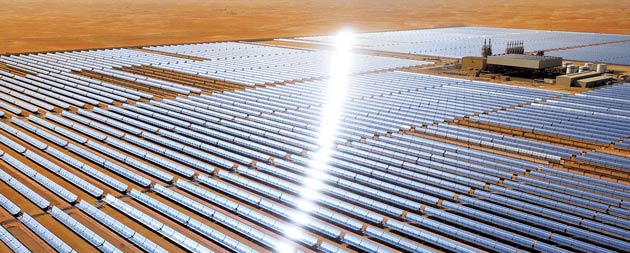GCC nations race to deploy solar projects
As countries from around the Gulf seek to increase alternative energy sources for power generation, solar energy could become one of the largest. The GCC is expected to deploy solar energy projects worth USD155 billion (QAR564 billion) in an attempt to generate a total power capacity of 84 gigawatts (GW) by 2017.
 The newly launched solar plant Shams 1 in the desert of Abu Dhabi. The 100-megawatt solar plant is the world’s largest concentrated solar power plant in operation. (Image Corbis)
The newly launched solar plant Shams 1 in the desert of Abu Dhabi. The 100-megawatt solar plant is the world’s largest concentrated solar power plant in operation. (Image Corbis)Qatar also has plans to implement solar energy into its renewable energy mix, with a strategy proposed to get 10 percent of the electricity and energy used in water desalination from solar energy by the year 2018.
Derek Burston, the exhibiton manager of GulfSol 2013, a high-level industry summit on solar to be held later in Dubai this year, said, “It is apparent that whilst the solar industry in other areas are struggling, right across MENA, the opportunities are there for companies to get themselves involved with a wealth of opportunities that are presenting themselves. Right now, nothing is hotter for solar than the Middle East.”
“To meet the goals that the GCC have set themselves means expertise will be needed from the international solar power industry to deal with the difficulties involved in construction in desert terrain, including dust, high winds and transmission requirements,” Burston added.
Expertise will be needed from the international solar power industry to meet the goals the GCC have set.
Saudi Arabia, the world’s largest oil producer, has even more ambitious plans. Renewable energy sources are likely to be very much of interest to the Saudi government considering a recent report by Citigroup Inc. that stated it could become an oil importer in the next 20 years. The Saudi government hopes to just about double its installed electricity capacity by building 54 GW of renewable energy (as well as 17.6 GW of nuclear power) by 2032, of which 41 GW will obtained from solar. Kuwait too has ambitions to derive 10 percent of its power requirements from renewable energy sources by 2020.
Abu Dhabi has set a goal of generating seven percent of its electricity from renewable sources by 2020 and the state-owned renewable energy company, Masdar, has announced that it will invest up to AED6 billion (QAR5.9 billion) in alternative energy schemes alongside the United Kingdom’s Green Investment Bank.
10% - The percentage of energy use in water-desal from solar by the year 2018 expected in Qatar.
However numerous challenges stand in the way of implementing these large-scale solar power projects. The feasibility of deploying solar power in remote areas, the creation of regulatory and policy frameworks for implementation of solar projects are also areas that need to be addressed. The push for solar energy does offer a range of unrealised opportunities in the region for international companies with experience in deploying such technologies elsewhere.
Like this story? Share it.





